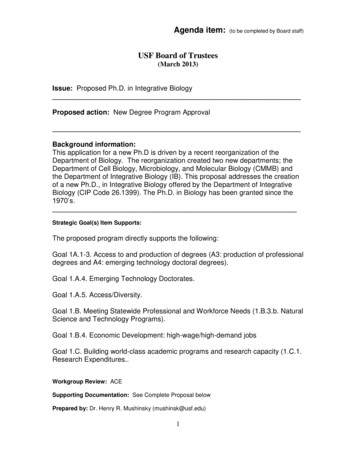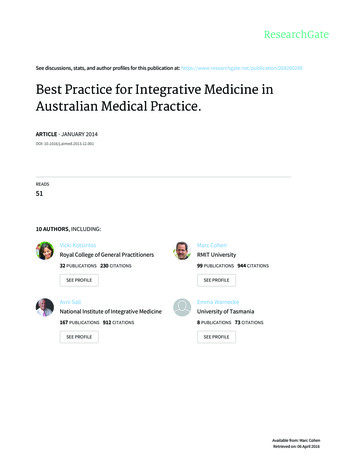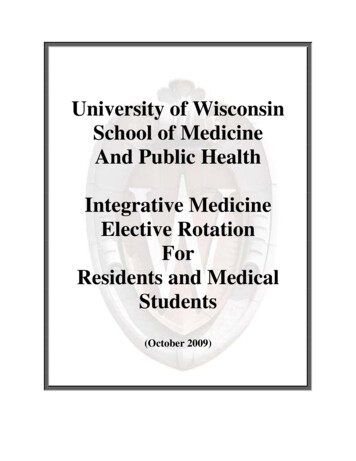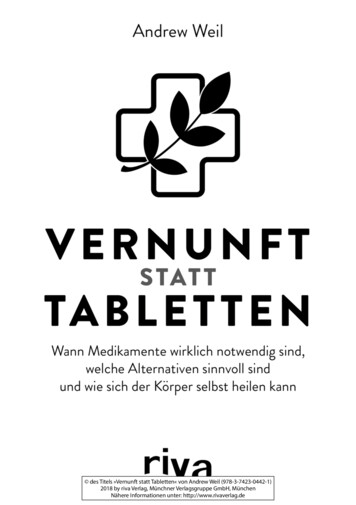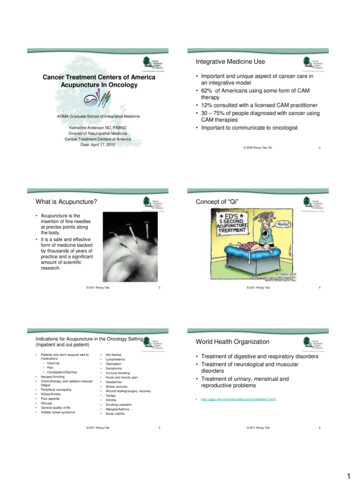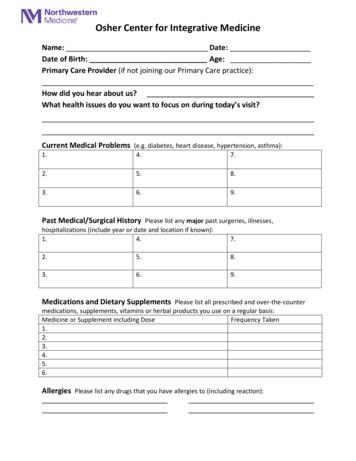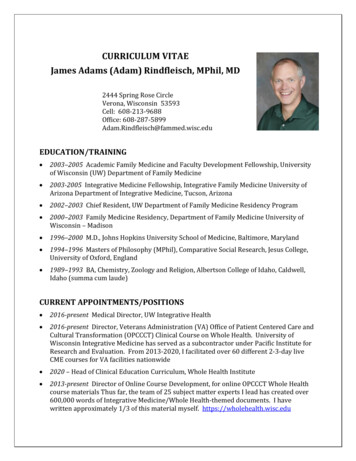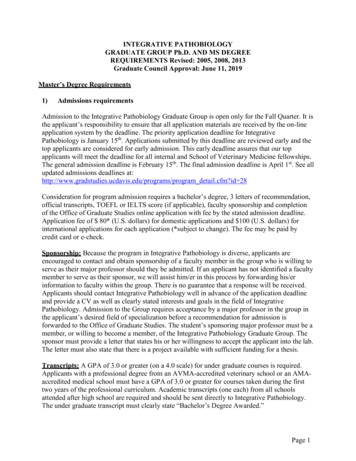
Transcription
INTEGRATIVE PATHOBIOLOGYGRADUATE GROUP Ph.D. AND MS DEGREEREQUIREMENTS Revised: 2005, 2008, 2013Graduate Council Approval: June 11, 2019Master’s Degree Requirements1)Admissions requirementsAdmission to the Integrative Pathobiology Graduate Group is open only for the Fall Quarter. It isthe applicant’s responsibility to ensure that all application materials are received by the on-lineapplication system by the deadline. The priority application deadline for IntegrativePathobiology is January 15th. Applications submitted by this deadline are reviewed early and thetop applicants are considered for early admission. This early deadline assures that our topapplicants will meet the deadline for all internal and School of Veterinary Medicine fellowships.The general admission deadline is February 15th. The final admission deadline is April 1st. See allupdated admissions deadlines gram detail.cfm?id 28Consideration for program admission requires a bachelor’s degree, 3 letters of recommendation,official transcripts, TOEFL or IELTS score (if applicable), faculty sponsorship and completionof the Office of Graduate Studies online application with fee by the stated admission deadline.Application fee of 80* (U.S. dollars) for domestic applications and 100 (U.S. dollars) forinternational applications for each application (*subject to change). The fee may be paid bycredit card or e-check.Sponsorship: Because the program in Integrative Pathobiology is diverse, applicants areencouraged to contact and obtain sponsorship of a faculty member in the group who is willing toserve as their major professor should they be admitted. If an applicant has not identified a facultymember to serve as their sponsor, we will assist him/er in this process by forwarding his/erinformation to faculty within the group. There is no guarantee that a response will be received.Applicants should contact Integrative Pathobiology well in advance of the application deadlineand provide a CV as well as clearly stated interests and goals in the field of IntegrativePathobiology. Admission to the Group requires acceptance by a major professor in the group inthe applicant’s desired field of specialization before a recommendation for admission isforwarded to the Office of Graduate Studies. The student’s sponsoring major professor must be amember, or willing to become a member, of the Integrative Pathobiology Graduate Group. Thesponsor must provide a letter that states his or her willingness to accept the applicant into the lab.The letter must also state that there is a project available with sufficient funding for a thesis.Transcripts: A GPA of 3.0 or greater (on a 4.0 scale) for under graduate courses is required.Applicants with a professional degree from an AVMA-accredited veterinary school or an AMAaccredited medical school must have a GPA of 3.0 or greater for courses taken during the firsttwo years of the professional curriculum. Academic transcripts (one each) from all schoolsattended after high school are required and should be sent directly to Integrative Pathobiology.The under graduate transcript must clearly state “Bachelor’s Degree Awarded.”Page 1
TOEFL (International applicants only): International students who do not have a degree froman institution where English was the language of instruction must obtain a minimum score of 550(written), 213 (computer based), or 80 for the new TOEFL iBT (iBT, internet-based) test. Theminimum IELTS score is seven on a nine point scale. It is strongly recommended that youelectronically report the TOEFL score directly to the institution. The TOEFL code for UC Davisis 004834 and the TOEFL code for Comparative Pathology (Integrative Pathobiology) is 56. ETSmay have a different description for our program names but this is the correct code forComparative Pathology (Integrative Pathobiology).Three letters of recommendation: Instructions are provided with the online application. Allletters of recommendation must be submitted electronically by the referee. The onlineapplication will automatically notify the referee and provide instructions on how to submit theletter. Hard copies of recommendation letters are not accepted.Meeting these criteria does not guarantee admission, but merely eligibility. The decision torecommend admission to the Dean of Graduate Studies will be made by the Program AdmissionsCommittee on the basis of available space and the competitiveness of applicants compared to theeligible pool.a)Prerequisites:In addition to the admission requirements stated above, applicants are expected to havea strong background in Cell Biology and the equivalent of the following UC Daviscourses:STA100BIS 104b)Applied Statistics4 unitsRegulation of Cell Function 3 unitsDeficiencies:Course work deficiencies can be made up in the Fall quarter of the first academic yearfollowing initial enrollment by earning a letter grade of “B” or better. The corecoursework for Integrative Pathobiology does not begin until the Winter quarter of thefirst academic year. Students are expected to make up deficiencies in statistics or cellbiology prior to entering Integrative Pathobiology Core I.2) M.S. Plan I:The Integrative Pathobiology Graduate Group follows the MS Plan I. This plan requires 30 units of graduateand upper division courses (the 100 and 200 series only) and, in addition, a thesis or a project in lieu of a thesis.At least 12 of the 30 units must be graduate work in the major field. The student is subject to guidance by theirmajor adviser regarding the distribution of his or her work. A Master’s of Science degree will be awarded uponfulfillment of the degree requirements. The minimum residency requirements for the MS degree is threequarters, but the amount of time spent by most students in this program is six to nine quarters. The thesis fulfillsthe capstone requirement.Page 2
3)Course Requirements - Core and Electives (18 units)a) Core Courses (18 units)PMIPMIPMIPMI201202203270Integrative Pathobiology Core IIntegrative Pathobiology Core IIExperimental DesignAdvanced Immunology5 units4 units2 units3 unitsEthicsPLP 298(either one of the 2 choices below)Ethics in Scientific Research2 unitsORResearch Ethics, RCR Program, UC Davis- attendance at 8 seminarshttp://research.ucdavis.edu/c/cs/rcrPMI 290PMI 290b)Group-Specific Seminar IGroup-Specific Research Seminar1 unit1 unitElective Courses (0 units)Electives should accommodate special interests of the student within the broad field ofIntegrative Pathobiology. Examples of fields of specialization in which electives may betaken are virology, infectious disease, immunology, pulmonary biology, environmentaldisease, neurobiology, developmental and stem cell biology, cancer biology, toxicology,cell biology and molecular pathobiology. There is a wide latitude in the electives that thestudents may pursue, although the electives must be consistent with the student’s thesisproject and be approved by the student’s graduate adviser. Examples of electives taken byour students include:MCB 121MCB 161MMI 280MIC 262BIM 189CMolecular Biology of Eukaryotic CellsMolecular GeneticsMolecular Pathology of Human and Animal DiseasesAdvanced General and Molecular VirologyClinical Applications for Biomedical Device Design3 units3 units3 units2 units2 unitsc) SummaryPlan I. The student is required to take a minimum of 30 quarter units of upper division andgraduate course work and submit a thesis based on original research. The courserequirements must be fulfilled by taking 18 units of core coursework and 12 of the 30 unitsmust be graduate work (lab rotations) in the major field as defined by the graduate adviserand the major professor. Electives are chosen with the approval of the graduate adviser. Forall students, there are 18 units of required course work. Most of the additional units areobtained by taking research courses (XXX - 299) from the major professor or othercollaborating faculty.Full-time students must enroll for 12 units per quarter including research, academic andseminar units. Per UC regulations, students cannot enroll in more than 12 units of graduatelevel courses (200) or more than 16 units of combined undergraduate and graduate level(100, 200, 300) courses per quarter. Courses that fulfill any of the program coursePage 3
requirements may not be taken S/U unless the course is normally graded S/U. Once courserequirements are completed, students can take additional classes as needed, although the 12units per quarter are generally fulfilled with research units (299) and perhaps seminars.Students in the MS program may change the degree objective to PhD if they haveoutstanding progress and endorsement from their major professor. MS students wishingto change their degree objective from an MS to a PhD must complete the Change ofDegree Objective form which requires signature by a faculty with admissions authority,and the student must also submit a letter from their major professor supporting thechange and confirming funding commitment. Students should also note that they will haveto fulfill all requirements for the PhD.4)Special requirementsStudents who have not obtained a previous degree at an approved English-medium institutionor demonstrated English-language proficiency through an appropriate exam (e.g. TOEFL) arerequired to complete appropriate English-language courses, as described in the policyGraduate Student Course Requirements – English as Second Language (GC2018-02).Courses taken in satisfaction of this requirement do not count towards the units required forgraduation5)Committeesa) Admissions Committee: Once the application completed, all supporting material, and theapplication fee have been received, the application will be submitted to the AdmissionsCommittee. The committee consists of 3 members of the graduate group, the Group MasterAdviser and the Group Chair. Based on a review of the entire application, arecommendation is made to accept or decline an applicant’s request for admission. Thatrecommendation is forwarded to the Dean of Graduate Studies for final approval ofadmission. Notification of admissions decisions will be sent by Graduate Studies.Applications are accepted through April 1st for the next Fall entering class.b) Course Guidance: Admitted students will be assigned a graduate advisor and the studentand advisor will meet prior to the start of classes to plan the student’s course of study. Inaddition to the required core courses the student’s graduate adviser will recommendadditional elective and seminar courses based on the student’s proposed thesis project andprior academic course work. Once the core course requirements are completed, studentscan take additional classes as needed. Students are required to have their graduate advisersign the annual progress report of satisfactory progress, in addition to obtaining thesignature of the student’s major professor.Thesis Committee: The thesis committee consists of the student’s major professor, whoserves as the chair of the thesis committee, and two other members who do not have to bemembers of the Graduate Group in Integrative Pathobiology. In consultation with thestudent’s major professor, the student proposes the composition of the committee. Thestudent’s graduate adviser must approve the committee members before submission to theOffice of Graduate Studies. Thesis Committee nominations are submitted to the Office ofGraduate Studies for formal appointment in accordance with Graduate Council policy.This takes place when the application for candidacy for the degree of Master of Science issubmitted. The student is expected to meet with their thesis committee at least once a year,Page 4
generally just prior to submission of the student’s annual progress report.6)Advising Structure and MentoringGraduate Advisers: All graduate advisers of the group are appointed in accordance withGraduate Council policies and Graduate Studies procedures to serve as deputies inmatters affecting individual graduate students and their academic programs. The graduateadviser sets the course outline for the student and provides guidance on elective coursesrelevant to the student’s thesis. In doing so the graduate adviser ensures that allrequirements of the Master’s Degree are met. The Graduate Adviser is a resource forinformation on academic requirements, policies and procedures, and registrationinformation.Master Adviser: The Master Adviser of the group serves as a deputy in matters affectingindividual graduate students and their academic programs. The Master Adviser overseesthe individual Graduate Advisers and provides uniformity in student advising. The masteradviser maintains records of each student’s performance. Forms and petitions used bygraduate students must be signed by an adviser or the Master Adviser.Major Professor: The major professor is the faculty member who provides detailedsupervision of a student’s thesis project and whose laboratory is usually the setting formost of the student’s research activities. The major professor is the Chair of theThesis Committee.Graduate Adviser (staff): The Graduate Program Staff assist students with identifying amajor professor, identifying appointments, identifying funding and fellowshipopportunities and general university policies and procedures to advance through theprogram.The Mentoring Guidelines can be found mentoring.pdf7)Advancement to CandidacyEvery student must file an official application for Candidacy for the Degree of Master ofScience after completing one-half of their course requirements and at least one quarterbefore completing all degree requirements; this is typically the Spring Quarter.The Candidacy for the Degree of Master form can be found online at:http://www.gradstudies.ucdavis.edu/forms/. A completed form includes a list of courses thestudent will take to complete degree requirements. If changes must be made to the student’scourse plan after s/he has advanced to candidacy, the Graduate Adviser must recommendthese changes to Graduate Studies. Students must have their Graduate Adviser andcommittee Chair sign the candidacy form before it can be submitted to Graduate Studies. Ifthe candidacy is approved, the Office of Graduate Studies will send a copy to: theappropriate graduate staff person and the student; the Thesis Committee Chair will alsoreceive a copy, if applicable. If the Office of Graduate Studies determines that a student isnot eligible for advancement, the department and the student will be told the reasons for theapplication’s deferral. Some reasons for deferring an application include: grade pointaverage below 3.0, outstanding “I” grades in required courses, or insufficient units.Page 5
8)Thesis Requirements:Thesis committee meetings: The candidate and major professor should meet at least once ayear with the other members of the thesis committee to discuss progress and any changes inresearch objectives. During the annual meeting with the Master Adviser, the candidate willbe asked about the timing and occurrence of thesis committee meetings.Thesis: Research for the Master's thesis is to be carried out under the supervision of afaculty member of the program and must represent an original contribution to knowledge inthe field. The thesis research must be conducted while the student is enrolled in theprogram. The thesis must be filed in a quarter in which the student is registered or on filingfee. The thesis is submitted to the thesis committee at least one month before the studentplans to make requested revisions. All committee members must approve the thesis andsign the title page before the thesis is submitted to Graduate Studies for final approval.Should the committee determine that the thesis is unacceptable, a recommendation todisqualify the student will be made to the Dean of Graduate Studies. The group stronglyrecommends that at least one manuscript derived from the thesis be submitted forpublication in a peer-reviewed journal before the thesis is finally approved.Instructions on preparation of the thesis and a schedule of dates for filing the thesis in finalform are available from Graduate Studies; the dates are also printed in the UC DavisGeneral Catalog and in the Class Schedule and Registration Guide issued each quarter. Astudent must have a GPA of 3.0 for the M.S. degree to be awarded.An exit seminar is required. Satisfaction of this requirement should be verified by theThesis Committee Chair.9)Normative Time to Degree:The Normative Time in Candidacy is six quarters. Students can complete all of their coursework requirements within one year (3 quarters) and theoretically, could complete theirthesis within the remaining year if the thesis committee approves. However, Master’sdegree students typically fulfill their thesis requirement in two to three years (six to nineacademic quarters).10) Typical Time Line and Sequence of Events:YearOneYearTwoFallWinterSTA100 Statistical Analysisor BIS 104 Regulation of CellFunctionElectives or CourseworkDeficiencesPMI 201 IntegrativePathobiology Core IPMI 270 AdvancedImmunologyPLP 298 Ethics in ScientificResearchPMI 290 SeminarFallWinterSpring(Thesis due)PMI 203 ExperimentalDesignSpring(advancement to MS candidacy)PMI 202 IntegrativePathobiology Core IIPMI 290 Research SeminarPage 6
11) Sources of fundingMS students can be fully supported financially from research funding from their majorprofessor or they can be self-supporting (own funding source). Funding can be augmentedby graduate group funding (UCD Graduate Fellowship), private foundations, orfellowships.12) PELP, In Absentia and Filing Fee status.Students are eligible to apply for the Planned Educational Leave Program (PELP), andafter advancement to candidacy, can apply for filing fee status. Rules and Regulationsabout PELP (Planned Educational Leave), In Absentia (reduced fees when researchingout of state), and Filing Fee status can be found in the Graduate Student ons/ .Page 7
Ph.D. Degree Requirements1)Admissions Requirements:Admission to the Integrative Pathobiology Graduate Group is generally open only for theFall Quarter. It is the applicant’s responsibility to ensure that all application materials arereceived by the on-line application system by the deadline. The priority applicationdeadline for Integrative Pathobiology is January 15th. Applications submitted by thisdeadline are reviewed early and the top applicants are considered for early admission. Thisearly deadline assures that our top applicants will meet the deadline for all internal andSchool of Veterinary Medicine fellowships. The general admission deadline is February15th. The final admission deadline is April 1st. See all updated admissions deadlines gram detail.cfm?id 28Consideration for program admission requires a bachelor’s degree, three letters ofrecommendation, official transcripts, TOEFL or IELTS score (if applicable), facultysponsorship and completion of the Office of Graduate Studies online application with feeby the stated admission deadline. Application fee of 80* (U.S. dollars) for domesticapplications and 100 (U.S. dollars) for international applications for each application(*subject to change). The fee may be paid by credit card or e-check.Sponsorship: Because the program in Integrative Pathobiology is diverse, applicants areencouraged to contact and obtain sponsorship of a faculty member in the group who iswilling to serve as their major professor should they be admitted. If an applicant has notidentified a faculty member to serve as his/er sponsor, we will assist them with this process.Applicants should contact Integrative Pathobiology well in advance of the applicationdeadline and provide a CV as well as clearly stated interests and goals in the field ofIntegrative Pathobiology. Admission to the Group requires acceptance by a major professorin the group in the applicant’s desired field of specialization before a recommendation foradmission is forwarded to the Office of Graduate Studies. The student’s sponsoring majorprofessor must be a member, or willing to become a member, of the IntegrativePathobiology Graduate Group. The sponsor must provide a letter that states his or herwillingness to accept the student into the lab. A project should be available for theapplicant. Also, funding sources for fees and stipend should be available and stated in theletter.Transcripts: A GPA of 3.0 or greater (on a 4.0 scale) for under graduate courses isrequired. Applicants with a professional degree from an AVMA-accredited veterinaryschool or an AMA-accredited medical school must have a GPA of 3.0 or greater forcourses taken during the first two years of the professional curriculum. Academictranscripts (one each) from all schools attended after high school are required and shouldbe sent directly to Integrative Pathobiology. The undergraduate transcript must clearlystate “Bachelor’s Degree Awarded.”TOEFL (International applicants only): International students who do not have a degreefrom an institution where English was the language of instruction must obtain a minimumscore of 550 (written), 213 (computer based), or 80 for the new TOEFL iBT (iBT, internetbased) test. The minimum IELTS score is seven on a nine point scale. It is stronglyPage 8
recommended that you electronically report the TOEFL score directly to the institution.The TOEFL code for UC Davis is 004834 and the TOEFL code for Comparative Pathology(Integrative Pathobiology) is 56. ETS may have a different description for our programnames but this is the correct code for Comparative Pathology.Three letters of recommendation: Instructions are provided with the online application.All letters of recommendation must be submitted electronically by the referee. The onlineapplication will automatically notify the referee and provide instructions on how to submitthe letter. Hard copies of recommendation letters are not accepted.Meeting these criteria does not guarantee admission, but merely eligibility. The decision torecommend admission to the Dean of Graduate Studies will be made by the ProgramAdmissions Committee on the basis of available space and the competitiveness ofapplicants compared to the eligible pool.a)Prerequisites:In addition to the admission requirements stated above, applicants are expected to have astrong background in Cell Biology and the equivalent of the following UC Davis courses:STA100Applied Statistics4 unitsBIS 104Regulation of Cell Function 3 unitsb)Deficiencies:Course work deficiencies can be made up in the fall quarter of the first academic yearfollowing initial enrollment by earning a letter grade of “B” or better. The core course workfor Integrative Pathobiology does not begin until the winter quarter of the first academicyear. Students are expected to make up deficiencies in statistics or cell biology prior toentering Integrative Pathobiology Core I.2)Dissertation Plan:The degree of Doctor of Philosophy is given under dissertation Plan B. An exit seminar isrequired.3)Course Requirements - Core and Electives (20 units)a) Core Courses (20 units)PMI 201PMI 202PMI 203PMI 270EthicsPLP 298Integrative Pathobiology Core I5 unitsIntegrative Pathobiology Core II4 unitsExperimental Design2 unitsAdvanced Immunology3 units(either one of the 2 choices below)Ethics in Scientific Research2 unitsORResearch Ethics, RCR Program, UC Davis- attendance at 8 seminarshttp://research.ucdavis.edu/c/cs/rcrPMI 290PMI 290Group-Specific Seminar IGroup-Specific Research Seminar1 unit1 unitPage 9
VariableResearch Seminars (2)2 unitsb) Elective Courses (0 units required)Electives should accommodate special interests of the student within the broad field ofIntegrative Pathobiology. Examples of fields of specialization in which electives may betaken are virology, infectious disease, immunology, pulmonary biology, environmentaldisease, neurobiology, developmental and stem cell biology, cancer biology, toxicology,cell biology and molecular pathobiology. There is a wide latitude in the electives that thestudents may pursue, although the electives must be consistent with the student’s thesisproject and be approved by the student’s graduate adviser. Examples of Electives taken byour students include:MCB 121MCB 161MMI 280MIC 262BIM 189CMolecular Biology of Eukaryotic CellsMolecular GeneticsMolecular Pathology of Human and Animal DiseasesAdvanced General and Molecular VirologyClinical Applications for Biomedical Device Design3 units3 units3 units2 units2 unitsc) Summary:The student is required to take a minimum of 30 quarter units of upper division andgraduate course work and submit a thesis based on original research. The courserequirements must be fulfilled by taking 20 units of core coursework and 10 of the 30 unitsmust be obtained by taking research courses (XXX - 299) from the major professor or othercollaborating faculty. Additional elective courses can be chosen with the approval of thegraduate adviser.Full-time students must enroll for 12 units per quarter including research, academic andseminar units. Per UC regulations, students cannot enroll in more than 12 units of graduatelevel courses (200) or more than 16 units of combined undergraduate and graduate level(100, 200, 300) courses per quarter. Courses that fulfill any of the program courserequirements may not be taken S/U unless the course is normally graded S/U. Once courserequirements are completed, students can take additional classes as needed, although the 12units per quarter are generally fulfilled with a research class (299) and perhaps seminars.4)Special RequirementsStudents who have not obtained a previous degree at an approved English-mediuminstitution or demonstrated English-language proficiency through an appropriate exam(e.g. TOEFL) are required to complete appropriate English-language courses, as describedin the policy Graduate Student Course Requirements – English as Second Language(GC2018-02). Courses taken in satisfaction of this requirement do not count towards theunits required for graduationPage 10
5)Committeesa) Admissions Committee: Once the application has been completed and all supportingmaterial, and the application fee have been received, the application will be submitted tothe Admissions Committee. The committee consists of 3 members of the graduate group,the Group Master Adviser and the Group Chair. Based on a review of the entireapplication, a recommendation is made to accept or decline an applicant’s request foradmission. That recommendation is forwarded to the Dean of Graduate Studies for finalapproval of admission. Notification of admissions decisions will be sent by GraduateStudies. Applications are accepted through April 1st for the next fall entering class.b) Course Guidance: Admitted students will be assigned a graduate advisor and the studentand advisor will meet prior to the start of classes to plan the student’s course of study. Inaddition to the required core courses the student’s graduate adviser will recommendadditional elective and seminar courses based on the student’s proposed thesis project andprior academic course work. Once the core course requirements are completed, studentscan take additional classes as needed, although, generally, students fulfill the minimumnumber of units with a research class (299). Students are required to have their graduateadviser sign the annual progress report of satisfactory progress, in addition to obtaining thesignature of the student’s major professor.c) Qualifying Examination Committee: The student, in consultation with his/her majorprofessor and graduate advisor, nominates four faculty to serve on the ExaminationCommittee. If the student has been admitted to a Designated Emphasis (DE), the Director ofthe DE must also approve the QE application before it is submitted. One member of the DEmust be part of the qualifying examination committee. These nominations are submitted tothe Office of Graduate Studies for formal appointment in accordance with Graduate Councilpolicy. The major professor does not serve as Chair of the committee. The QE Committeeconducts the exam and submits results to the Office of Graduate Studies.d) Dissertation Committee: The dissertation committee consists of the student’s majorprofessor, who serves as the Chair of the dissertation committee, and two other memberswho do not have to be members of the Graduate Group in Integrative Pathobiology. Inconsultation with the student’s major professor, the student proposes the composition of thecommittee. The student’s graduate adviser must approve the committee members beforesubmission to the Office of Graduate Studies. The composition of the dissertationcommittee is entered on the Advancement to Candidacy Form. Thesis Committeenominations are submitted to the Office of Graduate Studies for formal appointment inaccordance with Graduate Council policy. The student is expected to meet with theirdissertation committee at least once a year, generally just prior to submission of thestudent’s annual progress report. The role of the Dissertation Committee is to advise thedoctoral student on the research topic and methods, and then to review the final completeddissertation for acceptance. The Committee Chairperson (Major Professor) shoulddetermine the desires of the individual members regarding assistance with the research anddissertation review at the time the dissertation committee is constituted. Dissertationcommittee members are expected to read and comment on a dissertation within four weeksfrom its submission. This time limit policy does not apply to summer periods for facultyholding nine-month appointments. The student and faculty will coordinate a timeline forthe student to present the thesis to the dissertation committee. This timeli
accredited medical school must have a GPA of 3.0 or greater for courses taken during the first two years of the professional curriculum. Academic transcripts (one each) from all schools attended after high school are required and should be sent directly to Integrative Pathobiology.
